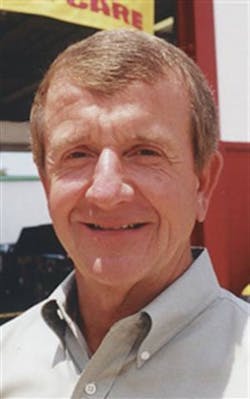Declaration of independence: MTD goes one on one with incoming TIA president Larry Morgan, who goes to great lengths to explain the need for the proposed 'checkoff' program
Larry Morgan bristles when asked if he's still an independent dealer. "I'm the most independent independent tire dealer there ever was," he says.
"That's the way I think, that's the way I act, that's the way I live.... My hair stands on end when anyone suggests that I'm not an independent. Those are fightin' words to me."
Morgan remains a major stockholder in Morgan Tire & Auto, which runs more than 500 Tires Plus outlets nationwide. In 2001 he sold a majority interest in his business to Bridgestone/Firestone Inc. (since renamed Bridgestone Americas Holding Inc.), which will own the chain completely by 2009. He also remains on the company's board of directors.
"I spend considerable time in my office at Morgan Tire/Tires Plus and assist in any way I can. I have a lot of pride in what our people have and are accomplishing there," he says.
Morgan has been a part of the tire industry since 1965, when he joined the former Firestone Tire & Rubber Co. as a trainee. In addition to managing tire company-owned stores, he was the driving force behind the growth in two independent chains, Merchant's Inc. (now owned by TBC Corp.) and Don Olson Firestone (now Tires Plus).
As he prepares to take over the presidency of the Tire Industry Association (TIA) from Tom Raben, Morgan is confident his experience, result-oriented philosophy -- and unique perspective -- will serve the organization well. He has the passion to make his tenure as president a great success in the eyes of the entire industry.
Modern Tire Dealer recently sat down with Morgan to discuss his goals for the coming year.
MTD: What do you hope to accomplish as president of TIA? How do you plan to accomplish these goals?
Morgan: My overall goal is to follow the direction of our strategic plan. The one aspect of the plan that I am most passionate about and believe would have the most impact on our entire industry is what has been referred to as the "checkoff" plan. I believe this would serve both consumers and our industry positively.
I plan on accomplishing these goals by effectively using the talent of our TIA staff, our board of directors and industry volunteers. We have already begun to operate TIA as a business with very specific objectives, timelines for accomplishment and within budgetary expectations. Our TIA staff is really stepping up to the challenge.
MTD: Since you brought it up, why are you sold on TIA's proposed checkoff program? My understanding is that if it becomes legislation in its current form, an additional 50 cents per passenger and light truck tire sold in the United States will be charged -- either to retailers or by retailers -- and funneled into a fund that the tire industry would use for educational, public relations and other activities.
Morgan: I have been a proponent of the checkoff program from the beginning. Our initial hope was that the tire manufacturers would fund the effort, but realizing the financial difficulties they are having, TIA changed directions.
(Getting full support) for it has been slow, but we're making progress. Everybody agrees that something needs to be done. There are differences of opinion as to the ways to go about it, but I think we're getting close.
Short term, to me, we just have to decide if we're going to do this or we're not going to do it. We're going to have another meeting to discuss the program in Las Vegas with the RMA (Rubber Manufacturers Association) in November.
MTD: So if it becomes law, who will pay the fees?
Morgan: The original thought was that the manufacturer would pay it and then pass along the cost to the people they sold tires to. But a recent federal ruling against a checkoff program in a similar industry has convinced us we need to go in another direction (see sidebar). That means the fee will have to be charged at the first point of purchase. So whoever buys the tire the first time, whether he is a wholesaler or a retailer or importer, will be responsible for the fee.
MTD: Who will collect and control the checkoff monies?
Morgan: The bill will be very specific on what the money can be spent for, and there will be an industry-wide group that will administer the program. It will collect the money and decide how it's going to be spent. It won't be the RMA and it won't be TIA. It will be an alliance with representation very specific to the industry.
If, say, a manufacturer sells a thousand tires to Sears, it will notify the stand-alone association that Sears bought a thousand tires. Sears will then owe the new entity that represents the industry $500. It will be government law that they will have to pay the $500.
MTD: Dealers may balk.
Morgan: The reality of it is long-term it's in their best interests.
MTD: Having both independent tire dealers and tire manufacturers as voting members will sometimes lead to a conflict of interests for TIA. A good example would be the split over molding D.O.T. codes on both sides of a tire: Tire dealers were for it, manufacturers were against it. So is TIA still a "tire dealer" association?
Morgan: It's inevitable that there will be an occasional difference of opinion or conflict of interest in any association that represents a broad spectrum of industry people. I can give you a good example.
Let's say our training and education budget for the coming year is $250,000. There are going to be people involved whose sole business purpose is commercial tires or whose sole business purpose is retail. There are going to be people there who maybe want to use the money for retreading. That's the way the government is run, with everybody vying for that budget dollar. And that's where we're going to have to put our mind in the right place and try to make the right decision for the industry.
Today, if you look at our training and education programs, a large percentage of it focuses on commercial tires.
TIA represents the entire industry; however, with most members being tire dealers, a large amount of our efforts are targeted to tire dealers. I can say unequivocally that a large, large, large, large percentage of our energy and money and strategic plan are centered toward tire dealers. Of course, if the tire dealers are successful, then everybody else in the industry rides along.
MTD: What is the most important issue facing independent tire dealers today?
Morgan: I think profitability and adding value to our businesses. It is such a shame because this can be fixed if everyone would join in the effort. We are hopeful the checkoff program will get us started in rectifying this issue.
MTD: What are TIA's plans for the retreading segment of the market?
Morgan: TIA has a strong contingent of retreaders on the board of directors. We have a retreader's council within TIA and have announced our plans for continuing the WTE (World Tire Expo) conference in 2005, which has a major concentration to retreading.
We also contribute to TRIB, and all our committees, such as training and education, government affairs, insurance and tire recycling have a responsibility to the retreading industry.
MTD: Is today' s supplier/dealer relationship the same as it was, say, 10 years ago?
Morgan: My observation is that it has improved substantially for several reasons. But most importantly, I believe suppliers have aligned their programs and policies to better serve the individual needs of various types of tire dealers. I think more dealers recognize a value in having a consistent relationship with a supplier or two vs. multiple suppliers.
MTD: How involved will you be in government affairs?
Morgan: We have a strong government affairs staff at TIA with Becky MacDicken's and Roy Littlefield's years of involvement. I plan to put those most interested and capable board members on this committee as well.
I will be involved in every major policy decision TIA makes regarding government affairs. I have personally contributed to our PAC as well to better position our industry in this important arena. I wish all tire dealers would do so as well.
MTD: Aren't there more tire dealer members on the board than non-tire dealers?
Morgan: Yes.
MTD: So you would think tire dealers could dictate policy for TIA.
Morgan: That's true. But we don’t get enough participation out of our membership. We need to get more people voting and/or change our bylaws so we can get a broader spectrum of the industry participating in the board. We have manufacturer's reps on the board, but I think we need a better cross-section of industry representation.
MTD: A big part of TIA's efforts seems to be focused on training.
Morgan: Training is really the best thing we can offer tire dealers. A large percentage of our members know it's important, but sometimes don't have the resources or don't make the commitment to it. Wherever you have quality people, your business flourishes. Everybody knows that.
If you go into any business and things aren't going right, it's typically not the people. They don't know what to do and how to do it and haven't been directed or trained. And that's an ongoing need without a doubt.
MTD: Has TIA's credit card been a success?
Morgan: A large percentage of our members really don't take advantage of Car Care One, which is an excellent program. It has high approval rates. The average ticket on a Car Care One card vs. a Visa or Mastercard is almost double. We just haven't done a good job of convincing tire dealers of that. Another major area on which we are focusing is insurance. In general, business in the whole industry -- I mean the whole world -- has been just pounded with insurance cost escalations. We've really worked hard in the last six months to come up with some insurance programs that will really be something tangible that will help our members.
MTD: Will you get out and meet the masses as president of TIA?
Morgan: Absolutely. In fact I spent considerable time on the road last year and have numerous dates booked for 2004 already.
MTD: Thanks, Larry.
About the Author

Bob Ulrich
Bob Ulrich was named Modern Tire Dealer editor in August 2000 and retired in January 2020. He joined the magazine in 1985 as assistant editor, and had been responsible for gathering statistical information for MTD's "Facts Issue" since 1993. He won numerous awards for editorial and feature writing, including five gold medals from the International Automotive Media Association. Bob earned a B.A. in English literature from Ohio Northern University and has a law degree from the University of Akron.
